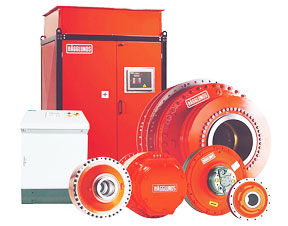Hydraulic Power Drives and Motors
Introduction
 A drive system that is different from the AC and DC drive, this drive does not require a transmission system. It consist of a constant speed AC motor driving a hydraulic pump which in turn drives a hydraulic motor and the associated controls. The entire package is often referred as the hydrostatic drive. A drive system that is different from the AC and DC drive, this drive does not require a transmission system. It consist of a constant speed AC motor driving a hydraulic pump which in turn drives a hydraulic motor and the associated controls. The entire package is often referred as the hydrostatic drive.
The hydraulic drive are preferred because the drive can be controlled quite well. Advanced version of hydraulic drives is being increasingly used in new and varied applications. Compared to other derives, the advantage of hydrostatic drives for extruders is the elimination of the need for a transmission between the hydraulic motor and extruder screw. The hydraulic drive in ideally suited for operations where there is are a constant requirement for stop and go motion.
Types of hydraulic drives
Hydrostatic drives are presently used in many demanding applications. At least three types of output performance are commonly available.
Variable Power, Variable torque transmissions: are based on a variable displacement pump supplying a variable displacement motor. These transmissions provide a combination of constant torque and constant power. These units are the most adjustable, most flexible and most expensive.
Constant Power, Constant variable torque transmissions: are based on a variable displacement pump supplying fluid to a fixed displacement motor under constant load. Speed is controlled by varying pump delivery. This is considered the best general-purpose drive, with wide speed range and simple controls.
Constant Power Variable Torque: transmission are based on a variable displacement pump with a power limited , driving a fixed displacement motor. Th main strength of this transmission is the efficiency.
Advantages
- Step-less adjustment of speed, torque and power,
- Smooth and controllable acceleration,
- Ability to be stalled without damage
- Easy controllability.
|